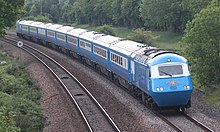Blue Pullmans
The sets were an advanced and luxurious design, befitting a Pullman train, although they did suffer some criticism particularly over a persistent ride quality problem.By 1972, with the development of first-class accommodation in Mark 2 coaching stock, the surcharge for Blue Pullmans seemed uneconomical and unreliable to passengers and BR managers, and in 1973 the trains were withdrawn.[3] Under the 1955 Modernisation Plan there was a push toward diesel power to replace steam locomotives, and Pullman coaching stock was ageing.Initially proposed as the Midland Pullman, it was timed to compete on the London to Manchester route against car and air travel.With the imminent withdrawal of the Midland Pullman, in 1965 one operated a trial from London King's Cross to Leeds via the East Coast Main Line.[13] A farewell commemorative special journey out and back from Paddington was run by the Western Region, travelling for 12 hours via High Wycombe, Banbury, Leamington Spa, Kenilworth, Coventry, Birmingham New Street, Cheltenham, Bristol Temple Meads, the Severn Tunnel, Swansea, Cardiff, Bristol Parkway, Didcot and Slough.[citation needed] The Irish national rail and bus operator Córas Iompair Éireann gave "serious consideration" to acquiring (and by implication, re-gauging by exchanging the standard gauge bogies with broad-gauge ones) the Blue Pullman sets but ultimately decided against it.The fixed couplings reduced much of the jerky movement experienced by conventionally buffered carriages and allowed smooth acceleration and stable running.The bogies had hydraulically damped helical springs, and the axles were pneumatically braked in a two-stage system, allowing highly controlled stopping.The units starred in the 1960 British Transport Films Blue Pullman directed by James Ritchie, which followed their development, preparation and a journey on the train.[27] A Blue Pullman made brief appearances in the 1965 Norman Wisdom film The Early Bird, destroying Pitkin's milk cart at a level crossing.In late 1962, the Kitmaster brand was sold by Rosebud Dolls to Airfix and it is thought the tools were destroyed in a fire, so no further kits were produced.In July 2010, Bachmann announced two Nanking blue versions of the Midland Pullman, with and without full yellow wrap-around ends.[34] In January 2018, Graham Farish announced planned production of versions of the Western Pullman in grey and blue livery,[35][36] which was available by the following year.







Blue Pullman (disambiguation)Swansea stationMetropolitan-CammellBlue PullmanMark 2British RailOld Oak CommonReadingTyseleyLondon Midland RegionWestern RegionPrime mover(s)SuperchargedRolls-Royce C8NFLHUIC classificationBogiesBraking system(s)WestinghouseMultiple workingTrack gaugeluxury trainsPullmandieselmultiple unitsNanking blueInterCity 125Metro-CammellBritish Transport CommissionBritish RailwaysLondon PaddingtonBirminghamWolverhamptonBristolCardiffSwanseaMidland PullmanLondon St PancrasManchester CentralMidland Main LineEustonManchesterMark 2 coaching stockrailtourCheadle HeathLondonGrand NationalLeicesterLoughboroughNottinghamWest Coast Main LineLondon EustonManchester PiccadillyMark 1East Coast Main LineBirmingham PullmanWolverhampton Low LevelBirmingham Snow HillHigh WycombeBristol PullmanBristol Temple MeadsLondon King's CrossOxfordBanburyLeamington SpaKenilworthCoventryBirmingham New StreetCheltenhamSevern TunnelBristol ParkwayDidcotSloughBristol Bath Road TMDCóras Iompair ÉireannSt PancrasClass 252Old Oak Common TMDRolls-RoyceFM RailClass 47sMark 2 carriagesCotswold RailLocomotive Services LtdrailtoursBritish Transport FilmsClifton ParkerLondon to Brighton in Four MinutesKnowle and Dorridge rail crashClass 52 WesternNorman WisdomThe Early BirdBachmann BranchlineKitmasterAirfixTri-angBachmannBritish Railway ModellingGraham FarishBritish N gaugeGeorge PullmanPullman CompanyBritish Rail brand namesList of British Rail classesAllen, G. FreemanTrains IllustratedIan Allan PublishingThe Railway MagazineRailway GazetteRailway Gazette InternationalRail ExpressToday's Railways UKModel RailRail EnthusiastDiesel and alternative fuel multiple units of Great BritainBritish United TractionDerby LightweightMetro-Cammell LightweightRailbusGWR railcarsLMS railcarsPacerailer180 (II)original TOPSSouthern RegionA-TrainCivity